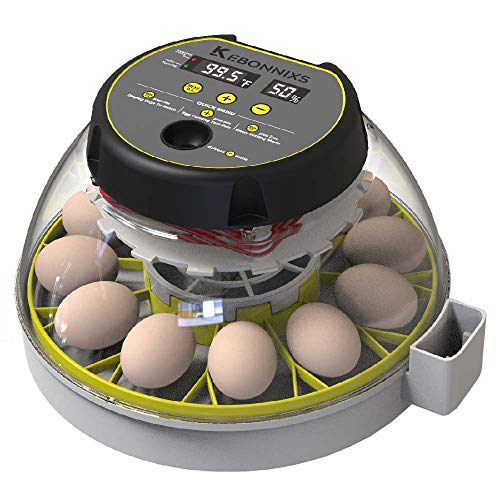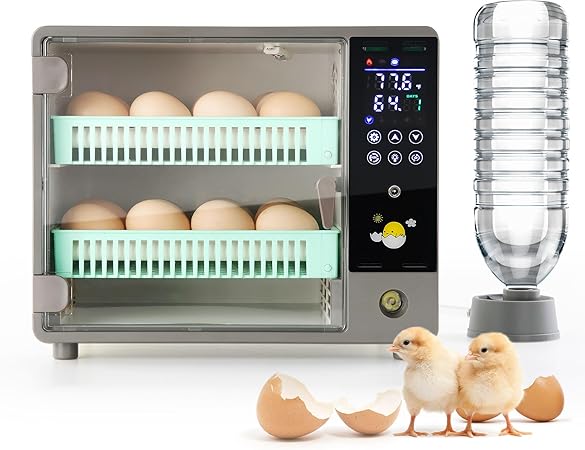Don’t Buy an Incubator Before Reading This!
It’s crucial that you know what to look for before investing in an incubator. From understanding the right size for your needs to considering important features like temperature control and humidity levels, there are key factors to keep in mind. In this article, I’ll break down everything you need to consider before making the big purchase, so you don’t end up regretting your decision later on. Let’s dive in!
Key Takeaways:
- Understand Your Needs: Before purchasing an incubator, consider factors like the type of eggs you want to hatch, quantity, and space requirements.
- Research Different Types: There are various types of incubators available, such as still-air, forced-air, and cabinet incubators. Understand the differences and choose one that suits your needs.
- Check Temperature and Humidity Control: Ensure that the incubator you choose has accurate temperature and humidity control features to increase hatch rates.
- Consider Turning Mechanism: Look for incubators with automatic turning mechanisms to ensure the eggs are turned regularly for proper development.
- Quality and Reputation: Invest in a reputable brand known for producing high-quality incubators to ensure better results and longevity.
The Hidden Costs of Incubators
For the aspiring entrepreneur looking to start their business, purchasing an incubator can seem like a smart investment. However, before you make the decision to buy one, it’s crucial to understand the hidden costs involved.
Initial Investment vs. Ongoing Expenses
Incubators may lure you in with their attractive initial price tags, but don’t be fooled. The true cost of owning an incubator lies in the ongoing expenses. From increased electricity bills to regular maintenance and operational costs, these expenses can quickly add up over time. It’s imperative to not only consider the upfront cost of the incubator but also factor in the long-term financial commitment you are making.
Unforeseen Maintenance and Repair Fees
Ongoing maintenance and repairs are often overlooked when purchasing an incubator. Unexpected breakdowns or malfunctions can result in costly repair fees that can strain your budget. Additionally, regular servicing to keep the equipment running smoothly is another expense that you need to account for. It’s imperative to be prepared for these unforeseen costs to avoid financial surprises down the line.
It’s crucial to budget not just for the purchase of the incubator, but also for the ongoing costs to keep it running efficiently. Unexpected maintenance and repair fees can quickly eat into your budget if you’re not prepared. Make sure to factor in these hidden costs before deciding to invest in an incubator.
Common Misconceptions About Incubators
Any aspiring entrepreneur knows that starting a business is no small feat. With the rise of startup culture, many believe that joining an incubator is a surefire way to success. However, there are common misconceptions about incubators that can lead entrepreneurs astray. Let’s debunk some of these myths to help you make an informed decision.
Debunking the “Easy Money” Myth
For those dreaming of quick riches, joining an incubator might seem like a shortcut to easy money. The reality, however, is far from this misconception. Incubators provide valuable resources and mentorship, but they do not guarantee success or instant profitability. Building a successful business takes hard work, dedication, and a solid business model – there are no shortcuts when it comes to entrepreneurship.
The Reality of Incubator Failure Rates
An important aspect to consider is the reality of incubator failure rates. While some may tout high success rates, the truth is that many startups fail, even those that have gone through an incubator program. It’s crucial to understand that joining an incubator does not immunize your business from failure. In fact, the failure rate for startups coming out of incubators is still significant.
Incubator Types: Which One is Right for You?
All incubators are not created equal! As far as choosing the right one for your needs, it’s crucial to understand the different types and their pros and cons. Recognizing that each type has its specific features will help you make an informed decision and ensure the successful hatching of your eggs.
Still Air Incubators: Pros
|
Still Air Incubators: Cons
|
Still Air Incubators: Pros and Cons
As far as Still Air Incubators, they are a more budget-friendly option for beginner hatchers. With a simpler design and quieter operation, they can be a great starting point. However, be aware of potential hot spots and uneven temperature distribution that may impact your hatch rates.
Forced Air Incubators: Weighing the Advantages
Types of Forced Air Incubators utilize fans to ensure consistent airflow throughout the unit, promoting a more uniform environment for your developing eggs. Plus, the regulated temperature control can lead to higher hatch rates and better overall success in hatching your chicks.
Features to Look for in an Incubator
Temperature Control and Accuracy
To ensure successful hatching, the temperature control and accuracy of your incubator are crucial. The temperature control needs to be precise to mimic a brooding hen’s natural warmth. Look for an incubator that offers a digital thermostat for accurate temperature adjustments. It’s vital that the temperature remains consistent throughout the incubation period to prevent any harm to the developing embryos.
| Features to Consider | Importance |
| Digital thermostat | Crucial |
| Consistent temperature | Essential |
Humidity Management and Egg Turning
For successful incubation, humidity management and egg turning are key aspects to consider in an incubator. The humidity levels need to be carefully monitored and regulated to ensure the eggs do not dry out or become too moist. Additionally, egg turning is imperative to prevent the embryos from sticking to the shell and promote even development. Look for an incubator that offers automated egg turning mechanisms to simplify this necessary task.
Accuracy in maintaining the right levels of humidity and ensuring regular egg turning can significantly impact the success rate of your hatch. Investing in an incubator with precise humidity control and automatic egg turning capabilities will increase your chances of a successful hatch.
The Importance of Research and Reviews
Many people rush into purchasing products without doing the necessary research beforehand. This can be especially risky when it comes to buying something as critical as an incubator for your precious eggs. Research and reviews are vital when making this investment to ensure you get a quality product that meets your needs.
Reading Between the Lines: Identifying Biased Reviews
To make an informed decision about which incubator to buy, you should read reviews thoroughly. However, not all reviews are created equal, and some may be biased. Look out for reviews that seem overly positive or negative, as they could be written by individuals with an agenda. Biased reviews can lead you astray and cause you to make a purchasing decision you may later regret.
Red Flags to Watch for in Incubator Reviews
Biased reviews often contain exaggerated claims or focus solely on one aspect of the product. If a review seems too good to be true or only highlights the positive aspects without mentioning any drawbacks, it’s important to proceed with caution. When reading reviews, pay attention to the language used and look for inconsistent information that may indicate bias.
In the world of incubator reviews, it’s crucial to sift through the noise and identify genuine feedback from users who have hands-on experience with the product. Trust reviews that provide a balanced perspective and mention both strengths and weaknesses of the incubator. Conducting thorough research and reading reviews critically will help you make an informed decision and choose an incubator that best suits your needs.
Alternatives to Incubators
Despite the convenience that egg incubators offer, there are viable alternatives worth considering before making a purchase. These alternatives may suit your needs better or provide a more cost-effective solution. Let’s explore two alternative options: natural brooding and DIY incubation.
Natural Brooding: Is it a Viable Option?
Viable – Natural brooding involves letting mother hens or other birds incubate and hatch the eggs themselves. This method is a natural and hands-off approach that can be highly successful if you have broody hens willing to sit on the eggs. However, it may not be suitable if you don’t have broody hens or if you’re looking to hatch a large number of eggs simultaneously.
DIY Incubation: A Cost-Effective Alternative?
Incubators – DIY incubation involves creating your own makeshift incubator using everyday items like a cardboard box, heat source, and a thermometer. While this method can be cost-effective, it requires careful monitoring of temperature and humidity levels to ensure successful hatching. Additionally, it may not provide the same level of control and consistency as a store-bought incubator would.
To determine if natural brooding or DIY incubation is right for you, consider factors such as the number of eggs you plan to hatch, your experience level, and the time and effort you’re willing to invest in the hatching process.
Final Words
The title “Don’t Buy an Incubator Before Reading This!” serves as a strong warning to those considering purchasing an incubator without proper knowledge or research. As I reflect on the information provided in this article, I am reminded of the importance of being cautious and well-informed before making any significant investment. I encourage you to research deeper into the topic, seek advice from experienced individuals, and explore forums like Adventures in incubation (chickens forum at permies) to gain valuable insights and ensure a successful incubation process.
Q: What factors should I consider before buying an incubator?
A: Factors to consider before buying an incubator include the size of the incubator, the type of eggs you will be incubating, the temperature control mechanism, the humidity control mechanism, and the cost. It is necessary to choose an incubator that meets your specific needs and requirements.
Q: What are the different types of incubators available in the market?
A: There are various types of incubators available in the market, including still-air incubators, forced-air incubators, circulated-air incubators, cabinet-style incubators, and mini incubators. Each type has its unique features and benefits, so it is necessary to choose the one that best suits your needs.
Q: How can I maintain the ideal temperature and humidity levels in the incubator?
A: To maintain the ideal temperature and humidity levels in the incubator, you should regularly monitor and adjust the settings as needed. It is also necessary to keep the incubator clean and well-ventilated to ensure proper airflow. Additionally, using a hygrometer and thermometer can help you accurately measure the temperature and humidity levels inside the incubator.
Q: Can I use an incubator to hatch different types of eggs?
A: Yes, you can use an incubator to hatch different types of eggs, including chicken, duck, quail, and even reptile eggs. However, it is necessary to adjust the temperature and humidity levels according to the specific requirements of the eggs you are incubating. It is also important to research and follow the recommended guidelines for hatching each type of egg successfully.
Q: How do I clean and maintain my incubator?
A: To clean and maintain your incubator, you should regularly remove and clean the eggs trays, water trays, and other components of the incubator. It is also important to sanitize the interior of the incubator using a mild disinfectant to prevent the growth of bacteria and mold. Additionally, you should inspect the incubator regularly for any signs of wear and tear and replace any damaged parts as needed to ensure optimal performance.







